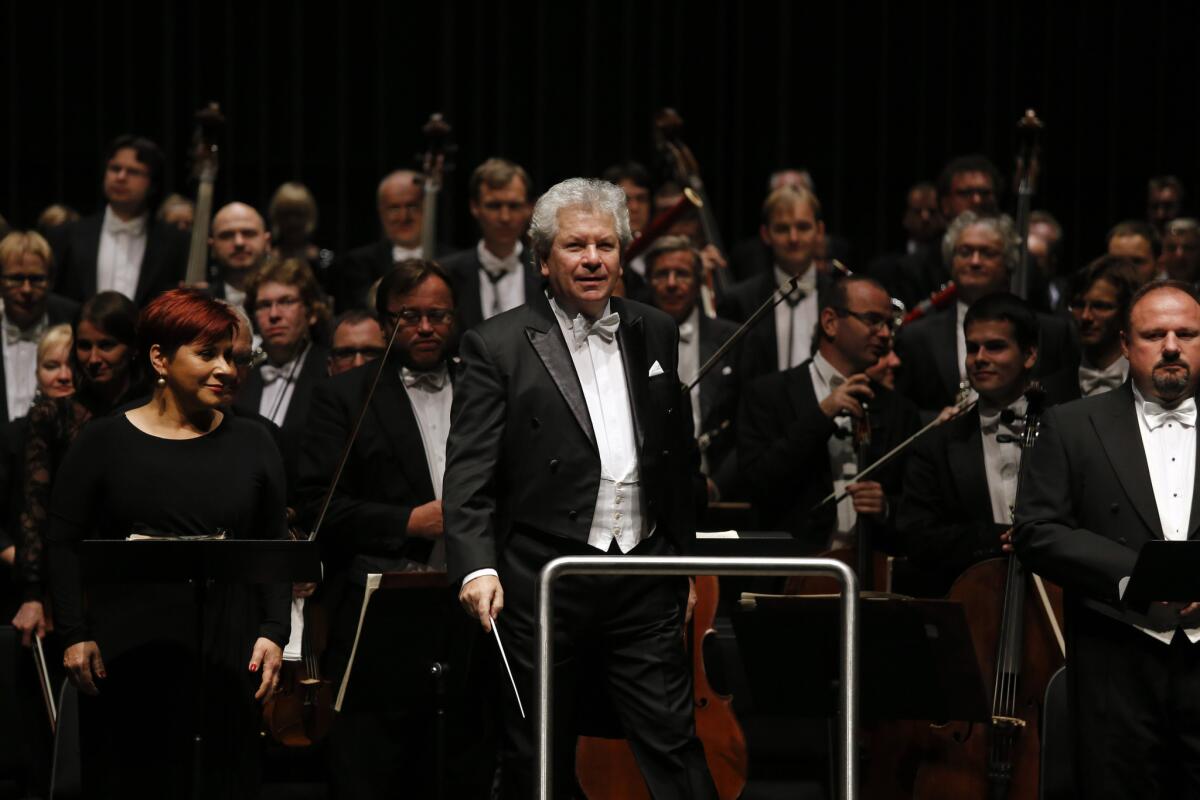Review: Seeking an inner light amid darkness of Dvorak’s Stabat Mater

- Share via
Music and sadness is an endless and much too studied subject.
Does sad music make us feel better by first making us feel worse, like, say, having a tooth pulled? Or do we feel better simply because we are thankful we may not suffer as, say, a grief-stricken Dvorák did when he wrote his Stabat Mater? All three of his young children had died over the previous two years.
Can a composer find consolation from sorrow by creating tones that correspond to emotions? Is there a higher power to be evoked? Or is the intense mental challenge of writing great music itself diverting, antidepression medication?
Dvorák’s somber Stabat Mater was given a rare performance Wednesday night by the Czech Philharmonic, the Prague Philharmonic Choir and four vocal soloists at the Valley Performing Arts Center. It was a sad concert. It was beautiful concert. It was, at its best (which wasn’t all the time), an inspiring concert.
The evening — involving 180 performers, the most the stage has ever held — was really an impressive risk for a performing arts center at the start of its fourth season. But what the evening wasn’t was illuminating.
Although Dvorák’s Stabat Mater, a setting of the 13th century Latin poem that describes Mary’s heartache standing before the Cross, is a popular Czech composer’s largest nonoperatic piece and considered among his most moving scores, it has little traffic these days outside the Czech Republic and Slovakia. Maybe it is too sad. But I don’t think so.
The Czech Philharmonic’s performance, conducted by Jirí Belohlávek, had a grim intensity. The VPAC made no effort to coddle or enlighten its audience. The program book contained no notes on the work, no Latin text or translation of the Stabat Mater, no context. No one onstage smiled. The music was asked to speak for itself.
I have no answers why this 90-minute score has little currency, whereas Brahms’ German Requiem and Verdi’s Requiem, which the Stabat Mater resembles, are part of the standard repertory. Dvorák was so influenced by them that he sounds here like Brahms for beginners or Verdi translated into Czech (although Dvorák retained the traditional Latin).
Perhaps the more interesting question is one of originality. What is the secret ingredient that makes this Stabat Mater unmistakably Dvorák? The score can’t match Brahms’ harmonic finesse or structural imagination or Verdi’s operatic excitability. Instead, Dvorák relies on simple but not obvious turns of phrase, on grace, on unflappability and on darkness’ inner light.
In this performance, Belohlávek emphasized monumentality but not grandiosity or sentimentality. The orchestra produced gritty, clotted textures (additional risers onstage might have helped). The chorus sounded more expansive. An unevenly matched quartet of soloists —soprano Lucie Silkanová, alto Dagmar Pecková, tenor Jaroslav Brezina and basso profundo Jan Martinik — strained to liquefy dry acoustics.
But focus remained on Dvorák’s score. The Stabat Mater begins in massive depression with typical stormy emotional climaxes underpinned by timpani rolls, huge brass and conventional chorus outbursts. The lyricism peeking through, however, is unexpected and original. The more that lyricism peeks through over time, the more convincing the Stabat Mater becomes.
By the end, Dvorák pulls out the stops with an impressive Handelian fugue and glorious Beethovenian finish. He transcends grief with goose bumps and glory, a glimpse at a better world. But this joy is no more convincingly conveyed by chorus, orchestra and soloists than is anguish.
Dvorák’s piety may be his therapy, but he never stops noticing the world around him. For “Tui nati vulnerati,” in which Mary asks to be noticed, Dvorák writes a short, flowing movement for chorus in 6/8 that is almost like a barcarole, gliding of its own accord.
Rather than showily seek understanding, the composer simply continues, doing what he knows how to do best, which is write bountiful music in his voice. This has nothing to do with sadness or telling a listener how to feel and everything to do with being. Belohlávek’s great achievement Wednesday was to trust this bounty.
The great achievement of the VPAC was to actually present this concert. The Czech Philharmonic began a U.S. tour Tuesday night in Costa Mesa with a standard program that concluded with Dvorák’s overplayed “New World” Symphony, the work that will be on all its programs, including a stop at Carnegie Hall, but for the Northridge concert and on Sunday at UC Berkeley. That’s sad.
Twitter: @markswed
More to Read
The biggest entertainment stories
Get our big stories about Hollywood, film, television, music, arts, culture and more right in your inbox as soon as they publish.
You may occasionally receive promotional content from the Los Angeles Times.











